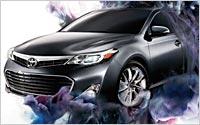 Today, virtually all Camrys sold in the U.S. are produced in the U.S., plus Nissan is going to start making its Rogue crossover here and is hiring 900 people to staff production. The company also
opened a battery plant for its Leaf electric car. Kia makes its Sorento SUV in Georgia. Volkswagen has a plant in Chattanooga, Tenn. BMW builds in Spartanburg, S.C.
Today, virtually all Camrys sold in the U.S. are produced in the U.S., plus Nissan is going to start making its Rogue crossover here and is hiring 900 people to staff production. The company also
opened a battery plant for its Leaf electric car. Kia makes its Sorento SUV in Georgia. Volkswagen has a plant in Chattanooga, Tenn. BMW builds in Spartanburg, S.C.
Consumer
perception be damned. In a world where cars are global and production is far flung, patriotic buyers hitting showrooms this week might want to know that some of the cars that are most American are
under Japanese brands.
So what are the "most American" cars on the market today? According to the National Highway Traffic Safety Administration (NHTSA), the Japanese
automakers are the real American brands, with Toyota Avalon the the most American sedan and Honda's Crosstour the most American hatch. Edmunds.com says Honda and Toyota have 50% of their products
built in the U.S.
advertisement
advertisement
Edmunds.com lists "most American vehicles" by category, based on NHTSA numbers. To wit, The Honda Crosstour is 75% North American; the Toyota Avalon is 80%
North American; the Toyota Tundra (Toyota has a Tundra plant in Texas) and Ford F-150 tie at 75% Canada and U.S.; Chrysler 200 is 74% North American made; the Camaro is 71% home grown and the Toyota
Venza and Caddie CTS Wagon tie at 65%.
“In a world of global supply chains, buying an ‘American’ car can be difficult,” says Edmunds.com Consumer Advice
Editor Carroll Lachnit. “A car’s ‘American-ness’ is often in the eye of the car shopper and the manufacturer. The 2013 Avalon, for example, was designed, engineered and
manufactured in the United States and 80% of its content is domestic. Many car buyers, however, reject the idea that a company based in Tokyo City makes ‘American’ cars.”
So, for a patriotic buyer, the question is whether a purchase of an “American” car from a foreign automaker means the money stays in the U.S. or returns to the
carmaker’s home country. Edmunds goes into depth about that. But one important take away
is from the Kogod Made in America Auto Index, developed by Frank DuBois, associate professor at American University's Kogod School of Business, who's data
is cited by Edmunds. Edmunds notes that DuBois assigns scores for such factors as where a company is headquartered (under the heading of "profit margin"), where most of the research and development
are done, where assembly occurs, and where the engine and transmission are produced.
His index gives an American-made car no credit in the profit margin category if the carmaker is
based overseas. With Ford Motor Co. and General Motors, DuBois argues, the majority of the company's shareholders are in the U.S., "and the profits go to the central coffers and are paid out" to
mostly U.S. shareholders. With a foreign carmaker such as Hyundai, Porsche or Toyota, the profits primarily go back to shareholders in their home countries, he reported.